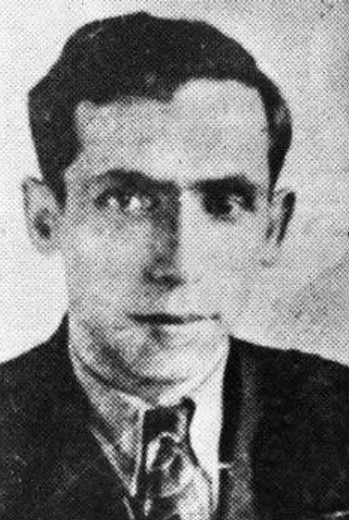
Many Greek veterans of the Spanish Civil War felt called to join the Communist cause in their own nation’s struggle against Metaxism. But as Ali Zahid shows, their homecoming was far from easy.
Ali is an MA student at the University of Barcelona.
In 1936 both Greece and Spain appeared to be on the precipice: the coup d’état of General Franco was reciprocated by the advent of Ioannis Metaxas as premier of Greece. For the Greeks who ventured to Spain to fight in the International Brigades the struggle was as much an attempt to overturn Metaxas’ regime back home. When Metaxas closed the routes by which volunteers travelled to Spain, the Greek Communist Party (KKE) stepped up, arranging transport from Paris and Marseilles. Numbering between 400 and 600, Greek volunteers would participate in some of the crucial battles of the civil war. Former volunteer Stefanos Tsermegas describes how “the courage and bravery shown by our volunteers in Spain halted the Fascist advance which aimed to cut off Valencia from Madrid.”[1] Adolf Hitler and Benito Mussolini’s support of the Nationalist faction resigned the Republicans to defeat. By 1938 the stream of I.B. fleeing to France found themselves in internment camps, enabling the organization of further resistance activities. Enrico Acciai sees this phase as “central for understanding the transition from the struggle in Spain to that of the resistance movements.”[2]
Drawing on new archival sources, my thesis aims to determine what long-term impact the Spanish Civil War had on Greek volunteers’ involvement in anti-resistance movements during the Nazi Occupation and the Greek Civil War.
Examples of archival material include personal testimonies of Spanish Civil War veterans, their interactions with the KKE, and simultaneously how the KKE perceived those who had fought in Spain. These correspondences offer a glimpse into the wider political scenario impeding former International Brigadiers’ reincorporation into civic and political society after the Spanish Civil War. Even if they come across as nostalgic, the recollections of Greek volunteers can help us understand the motivations for travelling to Spain, the impact of the Spanish Civil War on their participation in resistance movements, and finally how all these elements informed their ideas about the Greek Civil War.
A select number of social scientists and historians have already begun joining the dots that separate the Greek and Spanish civil wars. Even so, work remains to be done. Thus far, the evidence seems to indicate that Spanish Civil War veterans were ostracised, even abandoned, by the KKE. A letter from the International Brigades Association about the whereabouts of one prominent Greek communist and Spanish veteran confirms this. The letter of 25 April 1945 describes how:
We have just learned from an Athens cable that Nicos Karagiannis, formerly member of the International Brigades, who fought for two and a half years in Spain and was twice wounded, is in serious danger of his life in the Sudan. Karagiannis was Secretary of the Middle East Section of the Greek Maritime Union, and last summer was arrested and taken to a concentration camp in the Sudan. No charge was made against him, and he has had no trial.
Archives of the Trades Union Congress; Spanish Rebellion: International Brigade 1942-1954; 292/946/35/77(i).
Moreover, sources at the Greek Foreign Ministry Archives (MFA), such as the correspondence between the Greek ambassador in Madrid to the Greek Foreign Ministry throughout the 1940s demonstrate how the legacy of the International Brigades loomed large throughout the Second World War and the Greek Civil War. Kapetanidis, who was Greece’s representative in Madrid, sent several telegrams to Greece about the formation of a battalion of resistance fighters that included Spanish Civil War veterans in Milan, with plans to penetrate Greece and assist EAM and ELAS with their struggle in 1947.[3] Kapetanidis’ accounts include details about the commanders, supply of weapons, training, and the plans of attack of the IB battalion. This intelligence is corroborated by other manuscript sources. Nevertheless, these sources fall short of explaining whether they went to Greece, or more precisely what became of them. Further research in the Greek archives will hopefully provide the conclusion to this remarkable story.
Any prospect of an insurrection in Greece by the I.B. would have to receive the blessing of Joseph Stalin. However, as Geoffrey Swain notes, “Stalin’s support for the Greek communists… was seized on by the Americans.” [4] Eager to consolidate his gains, Stalin ordered that the Greek Civil War should be ended as soon as possible. [5] As a result, the idea of forming a unit of resistance fighters composed of Spanish veterans quickly fizzled out. It remains to be seen whether the Greek volunteers influenced Spanish communist ideas, as well as how far they served to bind Spanish and Greek communisms intellectually.
Finally, my project explores the rehabilitation of former KKE members and Spanish Civil War volunteers, with hopes of contributing to our understanding of the transformation of the KKE’s stance from 1936 up to 1949 and beyond.
Here Kostis Karpozilos’ study raises intriguing questions. Consider the case of Yiorgos Ermidis: one of the handful of Spanish Civil War veterans who returned to Greece to participate in the organisation of resistance in WWII and the Greek Civil War. During Greece’s internal conflict, Ermidis had volunteered with the Maritime Workers’ Brigade of the Democratic Army of Greece. In 1951, members of the brigade would find themselves trapped in Tashkent as the Soviet authorities feared information regarding the destination (Greece) of the Democratic Army being disclosed. Karpozilos notes how “realizing that Tashkent was to be the last stop in a life of constant mobility, the veteran of two civil wars – Ermidis had also fought in Spain – protested to Zachariadis, hoping the latter was not aware of this decision. The outcome suggests otherwise. Ermidis was put on trial for “anti-Soviet conduct” and was imprisoned in the Alexandrov Prison for five years.” [6]

NIKOS VAVOUDIS
A similar fate befell former Spanish Civil War volunteer Nikos Vavoudis. In November 1951 government forces raided the Vavoudis home at 39 Lykourgos in Kallithea (Athens). According to reports, Vavoudis had already shot himself, seeking to avoid capture. Vavoudis was denounced by the KKE as an enemy agent. What ensued encapsulated the struggle within the international communist movement, the aftermath of the Tito-Stalin split, that contained in its roots Tito’s decision to station Yugoslavian troops on Albanian territory in January 1948, at the height of the Greek Civil War. It points to the aura of suspicion fuelled by the misinformation fabricated by Greek Security forces.
This is very much work in progress and there is much that I am still wrestling with. I should end by reiterating how the cases of Ermidis and Vavoudis underscore the dilemmas confronting former resistance fighters. As the shadow of the Cold War fell, I.B. volunteers found themselves ostracised. Even though a decade separated the Spanish and Greek civil wars, memories of the resistance remained vivid and were frequently exploited: on the one hand by the authorities, to strengthen the campaign against the so-called communist ‘threat’, and on the other by clandestine factions, to galvanise the revolutionary struggle.
Notes
[1] Evidence from Stefanos Tsermegas. Contemporary Social History Archive (ASKI), Athens: Q4 26/1/68 , f. 10r.
[2] E. Acciai, “Albanian Transnational Fighters: From the Spanish Civil War to the European Resistance Movements (1936-1945),” War in History, 27.3 (2020): 355.
[3] Kapetanidis to Exoterikon V. Ypourgeion Diefthynsin Politikon Ypotheseon Tmima Valkanikis (Madrid), 24 and 29 Sep, 2 and 7 Oct. 1947. Historical Archive of the Ministry of Foreign Affairs (MFA), Athens. 1947/1/5/1.
[4] G. Swain, “The Comintern and Southern Europe, 1938-43,” in Tony Judt, ed., Resistance and Revolution in Mediterranean Europe, 1939–1948 (London: Routledge, 1998), p. 49.
[5] M. Djilas, Conversations with Stalin (New York: Harcourt Brace, 1962), pp. 181-2; Th. D. Sfikas, “Spanish Echoes in Greece, 1946–1949: The Myth of the Participation of an ‘International Brigade’ in the Greek Civil War,” Journal of Modern Greek Studies, 15.1 (1997): 98.
[6] K. Karpozilos, “The Defeated of the Greek Civil War: From Fighters to Political Refugees in the Cold War,” Journal of Cold War Studies, 16.3 (2014): 75.
.

